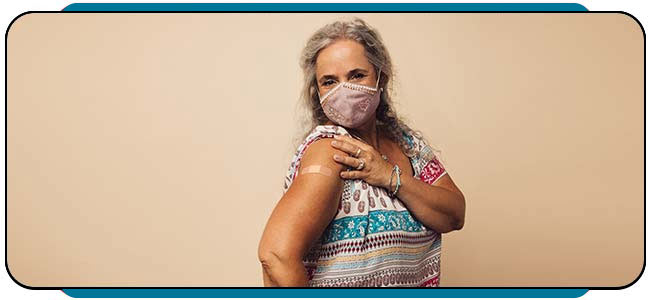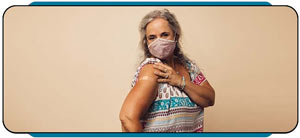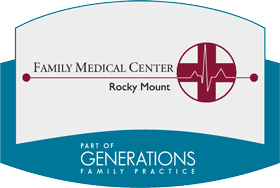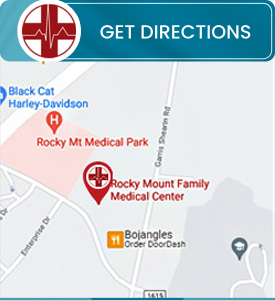Vaccines and Immunizations Clinic Questions and Answers
Immunizations are capable of protecting a newborn, child, or adult from serious diseases that could injure or kill them. Additionally, vaccinations reduce the possibility that you or your child will infect others. Our experts offer a variety of affordable vaccinations at Rocky Mount Family Medical Center in Rocky Mount, NC. For more information, contact us or request an appointment! We are conveniently located at 804 English Road, Suite 100 Rocky Mount, NC 27804.


Table of Contents:
How Do Vaccines Work?
Why Is It Important to Get Vaccinated?
Are Immunization and Vaccination the Same?
When Should I Get My Child Vaccinated?
Vaccines work by introducing a weakened form of an illness into the body to enable it to build immunity against that particular infection. An illness is caused when bacteria or viruses invade the body; the immune system then fights this infection using white blood cells consisting mainly of macrophages, B-lymphocytes and T-lymphocytes:
• Macrophages destroy germs, plus dead or dying cells. They leave behind some of the invading germs called antigens which the body identifies as the enemy and stimulates antibodies to attack them.
• B-lymphocytes are the defensive white blood cells that produce the antibodies.
• T-lymphocytes are also defensive white blood cells which attack cells that have already been infected.
Once this ‘artificial infection’ has gone, the body is left with T-lymphocytes and B-lymphocytes that will remember how to fight that disease in the future. It does, typically take a few weeks for the body to produce these warrior white cells after having received the vaccine so it is still possible to get the disease if the vaccine was administered around the time of infection as the vaccine won’t have had enough time to provide full protection.
Vaccinations are an important tool in the fight against serious preventable diseases. Some people would rather gain immunity from having the disease itself, rather than receiving a vaccine, but this can be dangerous as natural infections can cause severe complications and be deadly. Even with relatively mild diseases like chickenpox it is impossible to predict who may get seriously ill. Although many of these diseases are rare in the U.S., they do exist in other parts of the world and can be brought into the country, putting unvaccinated American children at risk. Vaccination is the best way to protect against these potentially deadly diseases. Reach out to our healthcare professionals to learn more about vaccination options and our services.
Although these two terms are often used synonymously, the Centers for Disease Control and Prevention (CDC) defines vaccination as the act of introducing a vaccine into the body to produce immunity, and immunization as the means by which a person becomes protected against a disease through receiving a vaccine. So, essentially, immunization is a result of vaccination.
According to the North Carolina Department of Health and Human Services (NCDHHS) all children must be vaccinated against certain diseases; the State’s requirement are as follows:
Diphtheria, tetanus and pertussis (DTaP)
Five doses:
• 3 doses by seven months of age
• 1 booster by 19 months of age
• 2nd booster on or after the fourth birthday and before starting school. If the first booster was given on or after the fourth birthday, the 5th dose isn’t required.
Hepatitis B (Hep B)
Three doses:
• 1 by three months of age
• 2nd dose by five months of age
• 3rd dose by 19 months of age
Haemophilus influenzae type b (Hib)
Three or four doses:
• by 16 months of age, depending on the vaccine used.
• 2 or 3 doses before seven months of age
• booster dose of any type between 12 months and 16 months of age.
NOTE: As there are various different brands (and requirements) of the Hib vaccine, parents should speak with their healthcare provider about the vaccine to be used and their child’s specific schedule.
Measles (MMR)
Two doses – a minimum of 4 weeks apart.
• 1st dose between 12 and 16 months of age
• 2nd dose before starting school
Mumps (MMR)
Two doses
• 1st dose between 12 and 16 months of age
• 2nd dose before starting school, college or university
Rubella (MMR)
One dose between 12 and 16 months of age
Poliomyelitis (polio)
Four doses:
• 2 doses by five months of age
• 3rd dose by 19 months of age
• booster dose on or after the fourth birthday and before starting school. The 4th dose is not required if the third dose was given on or after the fourth birthday.
Pneumococcal (PCV)
Four doses
• 3 doses by seven months of age
• booster dose between 12 and 15 months of age.
Children over the age of 5 are not required to have the pneumococcal (PCV) vaccine.
Varicella (Var)
Two doses – a minimum of 4 weeks apart.
• 1st dose between 12 and 19 months of age
• 2nd dose before starting school
Please see the NCDHHS website for more detailed information. If you would like to know more about vaccines for adults and children, contact Rocky Mount Family Medical Center today! We provide primary care services to promote health and wellness including ancillary services, diabetic services, employer services, family services, men’s health care, pediatric services, women’s health care and much more! For more information, contact us or request an appointment! We are conveniently located at 804 English Road, Suite 100 Rocky Mount, NC 27804. We serve patients from Rocky Mount NC, Nashville NC, Westry NC, Dortches NC, Red Oak NC, and Sharpsburg NC.

Additional Services You May Need
▸ Ancillary Services
▸ Diabetes Management
▸ Pediatric Care
▸ Family Care
▸ Men’s Health Care
▸ Women’s Health Care
▸ Employer Services
▸ Joint Injections (Cortisone)
▸ Laboratory Services
▸ Hypertension Treatment
▸ Vaccines and Immunizations
▸ Sports Physical Exam
▸ Flu Shots
▸ Dehydration Treatment
▸ Sunburn Treatment
▸ STD Testing



